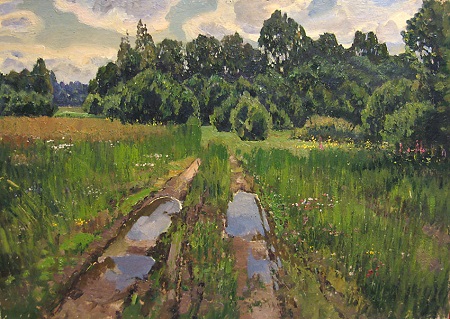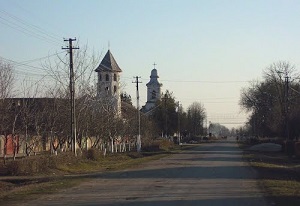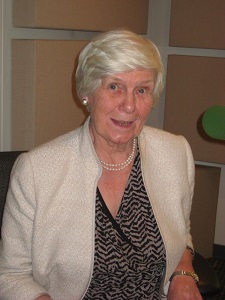Dolce far niente

Na de regen door German Tatarinov, 1980
Stimme des Regens
Die Lüfte rasten auf der weiten Heide,
Die Disteln sind so regungslos zu schauen,
So starr, als wären sie aus Stein gehauen,
Bis sie der Wandrer streift mit seinem Kleide.
Und Erd und Himmel haben keine Scheide,
In eins gefallen sind die nebelgrauen,
Zwei Freunden gleich, die sich ihr Leid vertrauen,
Und Mein und Dein vergessen traurig beide.
Nun plötzlich wankt die Distel hin und wider,
Und heftig rauschend bricht der Regen nieder,
Wie laute Antwort auf ein stummes Fragen.
Der Wandrer hört den Regen niederbrausen,
Er hört die windgepeitschte Distel sausen,
Und eine Wehmut fühlt er, nicht zu sagen.

Nikolaus Lenau (13 augustus 1802 – 22 augustus 1850)
Lenauheim (Hongaars Csatád) Nikolaus Lenau werd geboren in Lenauheim.
De Amerikaanse schrijfster Jhumpa Lahiri Vourvoulias werd geboren op 11 juli 1967 in Londen. Zie ook alle tags voor Jhumpa Lahiri op dit blog.
Uit: In Other Words
« Usually when I read Italian I don’t use a dictionary. Only a pen to underline the words I don’t know, the sentences that strike me.
When I come upon a new word, I have to make a decision. I could stop for a moment to learn the word immediately; I could mark it and go on; or I could ignore it. Like certain faces among the people I see on the street every day, certain words, for some reason, stand out, and leave an impression on me. Others remain in the background, negligible.
After I finish a book I return to the text and diligently check the words. I sit on the sofa, with the book, the notebook, some dictionaries, a pen strewn around me. This task of mine, which is both obsessive and relaxing, takes time. I don’t write the definitions in the margin. I make a list in the notebook. At first, the definitions were in English. Now they’re in Italian. That way I create a kind of personal dictionary, a private vocabulary that traces the route of my reading. Occasionally I page through the notebook and review the words.
I find that reading in another language is more intimate, more intense than reading in English, because the language and I have been acquainted for only a short time. We don’t come from the same place, from the same family. We didn’t grow up with one another. This language is not in my blood, in my bones. I’m drawn to Italian and at the same time intimidated. It remains a mystery, beloved, impassive. Faced with my emotion it has no reaction.
The unknown words remind me that there’s a lot I don’t know in this world. Sometimes a word can provoke an odd response. One day, for example, I discover the word claustrale (cloistered). I can guess at the meaning, but I would like to be certain. I’m on a train. I check the pocket dictionary. The word isn’t there. Suddenly I’m enthralled, bewitched by this word. I want to know it immediately. Until I understand it I’ll feel vaguely restless. However irrational the idea, I’m convinced that finding out what this word means could change my life.
I believe that what can change our life is always outside of us.
Should I dream of a day, in the future, when I’ll no longer need the dictionary, the notebook, the pen? A day when I can read in Italian without tools, the way I read in English? Shouldn’t that be the point of all this?
I don’t think so. When I read in Italian, I’m a more active reader, more involved, even if less skilled. I like the effort. I prefer the limitations. I know that in some way my ignorance is useful to me.
I realise that in spite of the limitations the horizon is boundless. Reading in another language implies a perpetual state of growth, of possibility. I know that, since I’m an apprentice, my work will never end.“

Jhumpa Lahiri (Londen, 11 juli 1967)
De Engelse schrijfster Jane Mary Gardam werd als Jane Pearson geboren op 11 juli 1928 in Coatham, North Yorkshire. Zie ook alle tags voor Jane Gardam op dit blog.
Uit: Een onberispelijke man (Vertaald door Joost Poort)
“Hij was ontzettend schoon. Je zou het zelfs opzichtig schoon kunnen noemen. Zijn stokoude nagels waren hagelwit omrand. De weinige nog steeds goudkleurige haartjes onder zijn knokkels zagen er altijd frisgewassen uit, net als zijn krullerige, nog steeds bronzen haar. Zijn schoenen glommen als kastanjes. Zijn kleding was altijd vers gestreken. Hij bezat de elegantie van de jaren twintig, want zijn kleding, hoe die er vooraf ook uitzag, stond hem altijd goed. Altijd een victoriaanse zijden zakdoek in zijn borstzakje. Altijd gele katoenen of zijden sokken van Harrods, en een paar onverslijtbare uit zijn tijd in het Verre Oosten. Zijn huid zag er gaaf en, bij slecht licht, jong uit.
Zijn collega-juristen noemden hem Filth, maar dat was niet ironisch bedoeld. Het was omdat ze dachten dat de oude grap van hemzelf afkomstig was: Failed In London Try Hong Kong. Er werd gezegd dat hij net na de oorlog, heel jong, heel arm, in een plotselinge opwelling de Londense advocatuur was ontvlucht, en dat hij van meet af aan enorm succesvol was geweest in Hongkong. Omdat hij een bescheiden man was, zo zei men, had hij zichzelf een parvenu, een oplichter, een losbol genoemd.
In werkelijkheid was Filth geen grappenmaker, was hij helemaal niet bescheiden over zijn werk en deed hij zelden, alleen in uiterste nood, iets in een opwelling. Hij was echter geliefd, bewonderd, iemand naar wie men vriendelijk glimlachte en over wie vele jaren na zijn pensionering nog vaak werd gepraat.
Nu, bijna tachtig, woonde hij in zijn eentje in Dorset. Zijn vrouw Betty was dood, maar hij mompelde nog vaak tegen haar terwijl hij door het huis struinde. Verrassend genoeg, gezien zijn hoge leeftijd, was zijn krullerige haar nog steeds niet grijs. Met zijn alerte ogen en geest was hij een geweldige man. Zo had men hem altijd gezien. Een man wiens achtenswaardige leven rustig en gelukkig was verlopen. Er hing geen oudemannenlucht in zijn huis. Hij was rijk en nam voor lief dat zijn woning (en hijzelf) zoals altijd werden schoongehouden, gevoed en gewassen door bedienden. Hij wist hoe hij met bedienden moest omgaan en ze bleven jarenlang bij hem.”

Jane Gardam (Coatham, 11 juli 1928)
Zie voor nog meer schrijvers van de 11e juli ook mijn blog van 11 juli 2016 en ook mijn blog van 11 juli 2015 deel 1 en ook deel 2.
